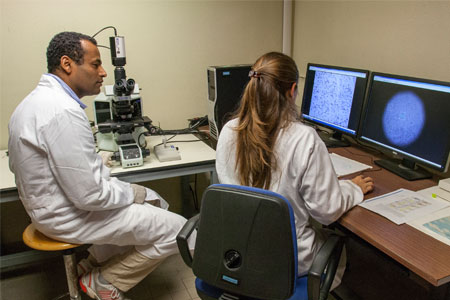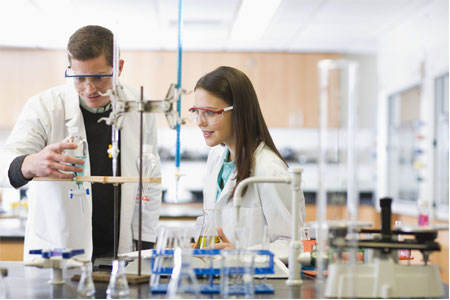- Authors:
-
Angerilli, Valentina; Vanoli, Alessandro; Celin, Giulia; Ceccon, Carlotta; Gasparello, Jessica; Sabbadin, Marianna; De Lisi, Giuseppe; Paudice, Michele; Lenti, Marco Vincenzo; Rovedatti, Laura; Di Sabatino, Antonio; Bazzocchi, Francesca; Lonardi, Sara; Savarino, Edoardo; Luchini, Claudio; Parente, Paola; Grillo, Federica; Mastracci, Luca; Fassan, Matteo
- Title:
-
Gastric carcinoma in autoimmune gastritis: a histopathologic and molecular study
- Year:
-
2024
- Type of item:
-
Articolo in Rivista
- Tipologia ANVUR:
- Articolo su rivista
- Language:
-
Inglese
- Format:
-
Elettronico
- Referee:
-
No
- Name of journal:
- Modern Pathology
- ISSN of journal:
- 0893-3952
- N° Volume:
-
37
- Number or Folder:
-
6
- Page numbers:
-
1-11
- Keyword:
-
autoimmune gastritis; biomarkers; gastric cancer; genomic profiling
- Short description of contents:
- : Patients with autoimmune gastritis (AIG) have a 13-fold risk of developing type-1 neuroendocrine tumors, whereas the risk for gastric adenocarcinoma is still uncertain. Here we describe the clinicopathological and molecular features of a series of gastric carcinomas (GC) arising in the context of AIG. A total of 26 AIG-associated GC specimens were collected from four Italian Institutions. Immunohistochemistry for MUC1, MUC2, MUC5AC, MUC6, CDX2, HER2, PD-L1, CLDN18, Mismatch Repair (MMR) proteins, and p53 and EBER in situ hybridization were performed. Histologic features and IHC were jointly reviewed by five expert gastrointestinal pathologists. Next-generation sequencing analysis (TrueSight Oncology 500, Illumina) of 523 cancer-related genes was performed on 19 cases. Most tumors were diagnosed as pT1 (52%), were located in the corpus/fundus (58%) and were associated with OLGA stage II gastritis (80.8%), absence of parietal cells, complete intestinal metaplasia and ECL-cell micronodular hyperplasia. Only 4 (15.4%) GCs were diagnosed during follow-up for AIG. The following histotypes were identified: 20 (77%) adenocarcinomas; 3 (11%) mixed neuroendocrine non-neuroendocrine neoplasms, and 2 (8%) high-grade solid adenocarcinomas with focal neuroendocrine component, 1 (4%) adenocarcinoma with an amphicrine component. Overall, 7 cases (27%) showed MMR deficiency, 3 (12%) were positive (score 3+) for HER2, 6 (23%) were CLDN18 positive, and 11 (42%) had PD-L1 Combined Positive Score ≥ 10. EBER was negative in all cases. Molecular analysis revealed 5/19 (26%) MSI cases and 7 (37%) TMB-high. The most frequently altered genes were: TP53 (8/19, 42%), RNF43 (7/19, 37%), ERBB2 (7/19, 37% [two amplified and five mutated cases]), ARID1A (6/19, 32%), and PIK3CA (4/19, 21%). In summary, AIG-associated GCs are often diagnosed at low stage in patients with long-standing misrecognized severe AIG; they often display a neuroendocrine component or differentiation, have relatively higher rates of MMR deficiency, and TMB-high.
- Product ID:
-
138939
- Handle IRIS:
-
11562/1124146
- Last Modified:
-
June 13, 2024
- Bibliographic citation:
-
Angerilli, Valentina; Vanoli, Alessandro; Celin, Giulia; Ceccon, Carlotta; Gasparello, Jessica; Sabbadin, Marianna; De Lisi, Giuseppe; Paudice, Michele; Lenti, Marco Vincenzo; Rovedatti, Laura; Di Sabatino, Antonio; Bazzocchi, Francesca; Lonardi, Sara; Savarino, Edoardo; Luchini, Claudio; Parente, Paola; Grillo, Federica; Mastracci, Luca; Fassan, Matteo,
Gastric carcinoma in autoimmune gastritis: a histopathologic and molecular study
«Modern Pathology»
, vol.
37
, n.
6
,
2024
,
pp. 1-11
Consulta la scheda completa presente nel
repository istituzionale della Ricerca di Ateneo 








